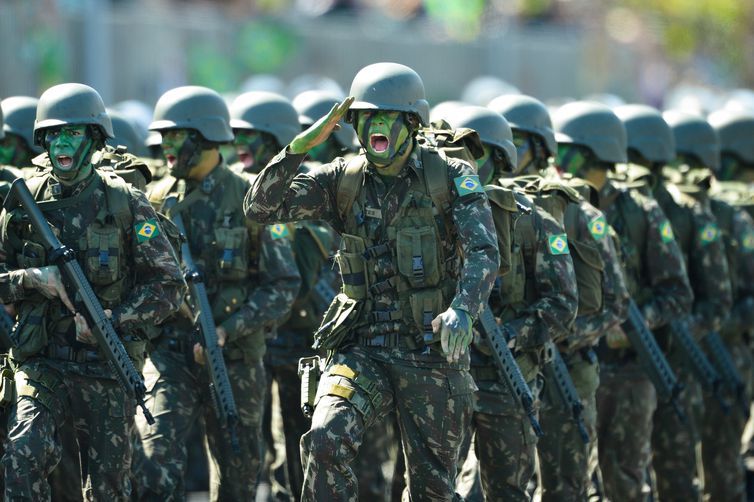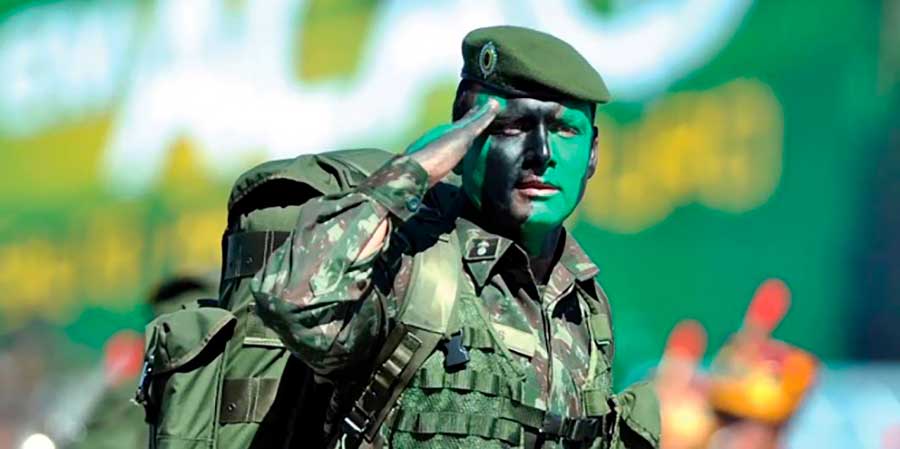Sgt Julio Cezar Rodrigues Eloi
On September 7th, we will celebrate another anniversary of our country’s political emancipation from Portugal. In dealing with the grandiosity that the time mark carries, since it is the Bicentennial, the Land Force’s indelible role in the fight for Independence, assured since 1822, a historical fact that marked the beginning of the Nation, must be highlighted (EB, 2021).
It is acknowledged that the Brazilian Army has its fighting spirit originated on April 19, 1648, on the occasion of the significant defeat to which the Dutch invaders were submitted, as a result of the union of the three races in the cradle of Brazilianness, in the 1st Battle of the Guararapes Hills, in the state of Pernambuco (GONDIM, 2011).
In organizational terms, it is interesting to point out the performance of the Count of Lippe’s disciple, the Germanic Lieutenant-General Johann Heinrich Böhn, in the Spanish-Portuguese war that occurred from 1776 to 1777. The conflict projected the defenses in the far south, safeguarded for the future Brazilian territory, in counterpoint to the once powerful Viceroyalty of the River Plate (OBERACKER, 1959).
The invasion of the metropolis, in the period of the Napoleonic wars, forced the royal family to find refuge in South America, so that, from the installation of the new capital of the Portuguese Empire in Rio de Janeiro, by elevation of Brazil to the category of Kingdom, there were prominent jobs of the Luso-Brazilian Armed Forces in the invasions of territories comprising French Guiana and the Oriental Republic of Uruguay (DONATO, 1987; and BARROSO, 2019).
In this context, researcher PAULA (1962) explains that a new reorganization of the Army occurred with the creation, by Dom João, of the 1st Cavalry Regiment in 1808, the current “Dragons of Independence”, as well as troop corps units of the other Arms and military educational establishments, in addition to the development of arsenals to avoid dependence on foreign material, which can be translated into the genesis of the Defense Industrial Base.
With the defeat of Napoleon Bonaparte on the Old Continent, the Lusitanian courts pressured Dom João VI to return to Portugal and transfer the seat of the monarchy to Lisbon. Growing pressures from overseas demanded the immediate return of Prince Pedro de Alcântara, who, convinced by the Brazilian elite, decided to “Fico” on January 9, 1822 (FAUSTO, 1996; and DE MENDONÇA, 2010).
From the attempts to downgrade our lands to a colony, emerges the independence movement, materialized on the banks of the Ipiranga stream, which, with the leadership of the heir of the Bragança dynasty and the fundamental support of land and naval forces, expels the Portuguese troops from the newly created Empire of Brazil, with dramatic episodes in the provinces of Cisplatina, Bahia, Piauí, Maranhão and Pará (DONATO, 1987; CALÓGERAS, 2009; VARNHAGEN, 2010; and BARROSO, 2019).
Such link with the defense of national integrity is confirmed in the imperial army’s fight for national interests in Brazil and abroad, highlighted by winning the various revolts that occurred during the regency period (Balaiada, Cabanagem, Farrapos, Liberals, and Sabinada). Such efforts are reinforced in the victories that occurred in the Platinum Issues during the II Reign, in the campaigns against Oribe and Rosas (1851-1852), Aguirre (1864), and in the War of the Triple Alliance (1865-70), as pointed out by DONATO (1987), BARROSO (2019), and BAZUCHI (2016).
The wearing down of the Empire as a political entity led to its replacement by the Republic, which required the maintenance of a fighting force capable of defending the interests of the Nation against various internal contestations. In this sense, new conflicts, such as the Federalist Revolution, the War of Canudos and the Contestado conflict, were destroyed with the use of the Land Force in the maintenance of the constituted powers (DONATO, 1987).
In the Vargas Era, the fight against the Axis powers, Germany, Italy and Japan, brought new doctrine and new equipment to the Brazilian Army. The Brazilian Expeditionary Force (FEB) was created, which played an important role in the success of the allies in operations during World War II, from 1942 to 1945. Even without the training and preparation of the American troops, the famous “pracinhas” (little soldiers) knew very well how to fulfill their mission in the fight against Nazi-fascism (MOREIRA BENTO, 1992).

As a result of its recognized professionalism, since the time of the League of Nations, a precursor entity of the current United Nations Organization (UNO), ANDRADE, FRANCO and SILVA FILHO (2019) clarify that the Brazilian Army began to contribute with various contingents in peace missions, starting with the sending of military observers to the Colombian locality of Leticia in 1936. Then, it went on to collaborate by sending troops to Suez (1956), Mozambique (1994), Angola (1995) and East Timor (1999-2006) and, in this 21st century, it collaborated in a more robust way, with the leadership of the multinational contingent in Haiti, starting in 2004.
In light of the events narrated, it is understood that the Army has a vast record of relevant services on behalf of the Brazilian nation and that, in addition to its core activity, it also collaborates with economic and social development through subsidiary actions, such as engineering works in the farthest corners of the Amazon (LEÃO, 2019), water distribution and the drilling of wells in the northeastern sertão, support to civil defense during calamities (GRENTESKI, 2020), welcoming refugees (PINHO, 2019) etc.
Thus, in this bicentennial of Brazil’s Independence, it is salutary to remember the relevant facts of our military history played by the Brazilian Army, the Brazilian Navy, and the Brazilian Air Force. As MENDES (2020) points out, they are institutions of great credibility before the population and responsible for safeguarding the more than 8 million km2 of national territory, about 17 thousand km of borders and almost 8 thousand km of coastline and incalculable riches.
References:
ANDRADE, I. O.; FRANCO, L. G. A.; SILVA FILHO, E. B. (2019). A atuação do Exército Brasileiro em operações de paz das Nações Unidas. In: Desafios contemporâneos para o Exército Brasileiro. Brasília: Institute of Applied Economic Research (IPEA), p. 155-181.
BARROSO, G. (2019). Military history of Brazil. Brasília: Federal Senate.
BAZUCHI, J. V. S. (2016). Critical essay on Brazilian foreign policy in the imperial period. Specialization in Politics and International Relations. Fundação Escola de Sociologia e Política de São Paulo (FESPSP). São Paulo.
CALÓGERAS, P. (2009). Formação Histórica do Brasil. Brasília: Federal Senate.
DE MENDONÇA, S. R. (2018). The independence of Brazil in historiographical perspective. Revista Pilquen. Sección Ciencias Sociales, 12(1), p. 1-10.
DONATO, H. (1987). Dicionário de Batalhas Brasileiras – dos conflitos com os indígenas, às guerrilhas políticas urbanas e rurais. São Paulo: IBRASA.
EXÉRCITO BRASILEIRO [EB]. (2021). Ordinance EME/ C Ex nº 620, of December 13, 2021. Approves the Guideline for the commemorations of the Bicentennial of the Independence of Brazil (EB-20-D-01.089).
FAUSTO, B. (1996). História do Brasil. São Paulo: University of São Paulo Press (EDUSP).
GONDIM, A. M. C. (2011). A pátria nasceu aqui: o discurso das batalhas dos Guararapes e a educação nas décadas de 1960 e 1970. Master’s dissertation. Graduate Program in Education, Federal University of Pernambuco (PPGEdu/ UFPE). Recife.
GRENTESKI, A. L. (2020). Expansion of the Brazilian Army’s immediate actions in support of calamities originating from climatic events. Specialization in Army Policy, Strategy and Senior Management. Army School of Command and Staff (ECEME). Rio de Janeiro.
LION, E. M. (2019). The participation of the Construction Engineering Units in the integration of the Brazilian Amazon region from the period of the military governments to the present day. Specialization in Military Sciences. Army Command and Staff School (ECEME). Rio de Janeiro.
MENDES, L. O. C. (2020). Bicentennial of the Independence of Brazil: the evolution of the constitutional role of the Brazilian Army over the two hundred years of the Independence of Brazil. Specialization in Military Sciences. Officer Training School (EsAO). Rio de Janeiro.
MOREIRA BENTO, C. (1992). The Two Faces of Glory. A Defesa Nacional, (755), p. 59-62.
OBERACKER Jr., C. H. (1959). João Henrique Böhn: the founder of the Brazilian Army. Revista de História da USP, v. 18, nº 38, p. 339-357.
PAULA, E. S. (1962). As origens do Exército Brasileiro. Revista de História da USP, v. 24, n. 49, p. 57-72.
PINHO, A. P. (2019). The Brazilian Army in Operation Acolhida. Specialization in Army Policy, Strategy and Senior Management. Army Command and Staff School (ECEME). Rio de Janeiro.
VARNHAGEN, F. A. (2010). History of the Independence of Brazil. Brasília: Federal Senate.
*** Translated by the DEFCONPress team ***
